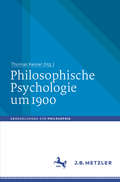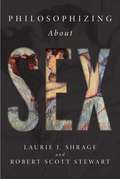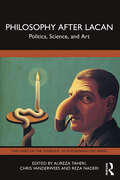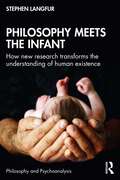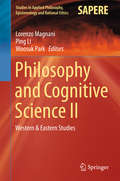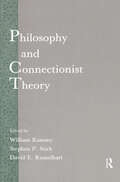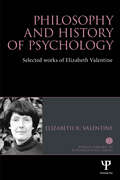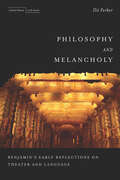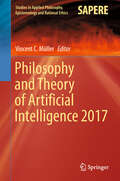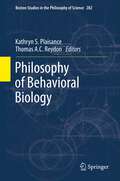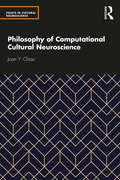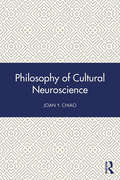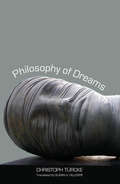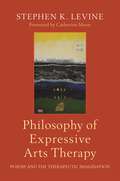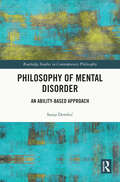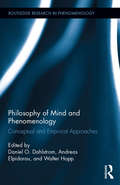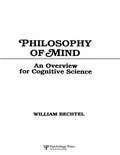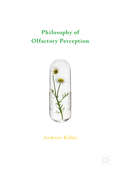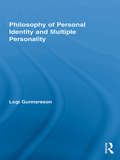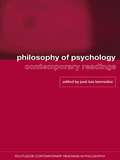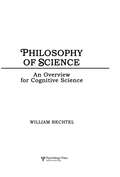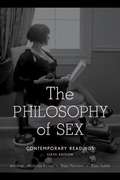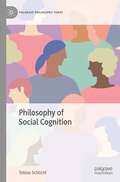- Table View
- List View
Philosophie der Führung
by Dieter Frey Lisa Katharin SchmalzriedFührungskräfte arbeiten heute in einem unsicheren Umfeld mit wachsenden Anforderungen und immer variableren Rahmenbedingungen. Dennoch müssen sie Sicherheit ausstrahlen und ihren Mitarbeitern eine Orientierung bieten. Viele Führungskräfte empfinden dies als belastend und suchen nach einer Art Kompass, an dem sie ihr Handeln ausrichten können, nach dauerhaften Prinzipien für eine "gute Führung". Dieses Buch bietet einen solchen Kompass und leitet dazu "neue" Erkenntnisse aus uralten Theorien ab: Hätten Sie gedacht, dass die großen Philosophen von Kant über Rousseau bis Popper Anregungen für Ihr tägliches Führungshandeln bereit halten? - Wie Sie nach Ansicht Aristoteles als Chef ein gutes Vorbild werden? Wie Sie laut Hobbes mit egoistischen Mitarbeitern umgehen können? Wie nach Popper ein kritischer Dialog zu besseren Entscheidungen führen kann? Den Autoren dieses Buches gelingt es, in übersichtlichen Kapiteln verständlich und knapp die Grundlagen einer Theorie zu erklären, praktische Hinweise für eine moderne Führungskraft abzuleiten und schließlich ein verständliches Modell einer ethikorientierten Führung zu formulieren. - Kernthese: Gute Führung, die sich moralischen Werten verpflichtet sieht, ist auch eine erfolgreiche Führung! Und ganz nebenbei liest sich das Buch als eine unterhaltsame Einführung in die großen philosophischen Theorien. Für alle, die mit Aufgaben der Menschenführung betraut sind, ob in sozialen und kommerziellen Organisationen, im Bildungsbereich oder der Kindererziehung.
Philosophische Psychologie um 1900 (Abhandlungen zur Philosophie)
by Thomas KesselDieser Band stellt die eigentümlichen Mischungsverhältnisse natur- und geisteswissenschaftlicher Perspektiven im Feld der philosophischen Psychologien um 1900 ins Zentrum. Diese Konzeptionen, die den engen Rahmen des Psychologismus-Streites überschreiten und ihn gleichwohl kontextualisieren, werden durch Beiträge zu Franz Brentano, Wilhelm Dilthey, Carl Stumpf, Theodor Lipps, Wilhelm Wundt, Oswald Külpe, Edmund Husserl, Wilhelm Windelband, Paul Natorp und Nicolai Hartmann repräsentiert.
Philosophizing About Sex
by Laurie J. Shrage Robert Scott StewartAncient Greek philosophers, medieval theologians, Enlightenment thinkers, and contemporary humanists alike have debated all aspects of human sexuality, including its purpose, permissibility, normalcy, and risks. Philosophizing About Sex provides a philosophical guide to those longstanding and important debates. Each chapter takes a general issue (freedom, privacy, objectification, etc.) and shows how ongoing public discussions of sexuality can be illuminated by careful philosophical investigation. Debates over topics such as sexual assault, sexual orientation, sex education, prostitution, and “sexting” involve larger questions about morality, law, science, and politics and cannot be intelligently discussed in isolation from broader issues. By asking deceptively simple questions, this book shows how difficult but important it is to arrive at satisfying answers.
Philosophy After Lacan: Politics, Science, and Art (The Lines of the Symbolic in Psychoanalysis Series)
by Alireza Taheri Chris Vanderwees Reza NaderiPhilosophy After Lacan: Politics, Science, and Art brings together reflections on contemporary philosophy inspired by and in dialogue with Lacanian theory.Rather than focus on the thinkers who came before Lacan, the editors maintain attention on innovations in contemporary philosophy that owe their emergence to complimentary, critical, direct, or tangential engagement with Lacan. This collection makes one of the first concerted efforts to expand discussions between psychoanalysis and more recent philosophical thinkers while gathering chapters by some of the leading philosophical voices of the present moment. With contributors from around the world, this book has international appeal and is unique in its emphasis on contemporary philosophies inspired or influenced by Lacan.Philosophy After Lacan will not only appeal to psychotherapists and psychoanalysts, but also to students and professors of philosophy, critical theory, psychology, politics, history, and literature.
Philosophy Meets the Infant: How New Research Transforms the Understanding of Human Existence (Philosophy and Psychoanalysis)
by Stephen LangfurInfancy research and philosophy explore “first things,” yet few books bring the two fields into contact. Stephen Langfur’s Philosophy Meets the Infant integrates groundbreaking infancy studies of the last 50 years to offer a fresh exploration of our drive for human connection. He begins with a new understanding of self-awareness, which he locates in reciprocal attention between baby and caregiver. Instead of “I think, therefore I am,” the new research supports “You attend, therefore I am.” The event of becoming self-aware through another is termed a “You-I Event.”The idea is counterintuitive: we are perfectly self-aware when alone! To explain the change after infancy, Langfur makes transformative use of an old psychoanalytic finding. With the onset of language, a child internalizes (introjects) the most important You’s, playing them toward herself in speech. Instead of the original You-I Event, we have its counterfeit in our heads. Nevertheless, a longing for the true Event persists in the unconscious; individual chapters trace this longing in work, love, art, conversation, and religion.Organized into three parts (“The You-I Event in infancy and why it disappears," "The You-I Event after infancy," and "Philosophical Issues"), this book will be of keen interest to philosophers, infancy researchers, and anyone seeking new light on the major questions of human existence.
Philosophy and Cognitive Science II
by Ping Li Lorenzo Magnani Woosuk ParkThe book shows how eastern and western perspectives and conceptions can be used to addresses recent topics laying at the crossroad between philosophy and cognitive science. It reports on new points of view and conceptions discussed during the International Conference on Philosophy and Cognitive Science (PCS2013), held at the Sun Yat-sen University, in Guangzhou, China, and the 2013 Workshop on Abductive Visual Cognition, which took place at KAIST, in Deajeon, South Korea. The book emphasizes an ever-growing cultural exchange between academics and intellectuals coming from different fields. It juxtaposes research works investigating new facets on key issues between philosophy and cognitive science, such as the role of models and causal representations in science; the status of theoretical concepts and quantum principles; abductive cognition, vision, and visualization in science from an eco-cognitive perspective. Further topics are: ignorance immunization in reasoning; moral cognition, violence, and epistemology; and models and biomorphism. The book, which presents a unique and timely account of the current state-of-the art on various aspects in philosophy and cognitive science, is expected to inspire philosophers, cognitive scientists and social scientists, and to generate fruitful exchanges and collaboration among them.
Philosophy and Connectionist Theory (Developments in Connectionist Theory Series)
by William Ramsey Stephen P. Stich David E. RumelhartThe philosophy of cognitive science has recently become one of the most exciting and fastest growing domains of philosophical inquiry and analysis. Until the early 1980s, nearly all of the models developed treated cognitive processes -- like problem solving, language comprehension, memory, and higher visual processing -- as rule-governed symbol manipulation. However, this situation has changed dramatically over the last half dozen years. In that period there has been an enormous shift of attention toward connectionist models of cognition that are inspired by the network-like architecture of the brain. Because of their unique architecture and style of processing, connectionist systems are generally regarded as radically different from the more traditional symbol manipulation models. This collection was designed to provide philosophers who have been working in the area of cognitive science with a forum for expressing their views on these recent developments. Because the symbol-manipulating paradigm has been so important to the work of contemporary philosophers, many have watched the emergence of connectionism with considerable interest. The contributors take very different stands toward connectionism, but all agree that the potential exists for a radical shift in the way many philosophers think of various aspects of cognition. Exploring this potential and other philosophical dimensions of connectionist research is the aim of this volume.
Philosophy and History of Psychology: Selected works of Elizabeth Valentine (World Library of Psychologists)
by Elizabeth R. ValentineIn the World Library of Psychologists series, international experts themselves present career-long collections of what they judge to be their finest pieces – extracts from books, key articles, salient research findings, and their major practical theoretical contributions. Elizabeth Valentine has an international reputation as an eminent scholar and pioneer in the field of philosophy and history of psychology. This selection brings together some of her best work over the last thirty years. A specially written introduction gives an overview of her career and contextualises the selection in relation to changes in the field during this time. The first section on ‘Philosophy’ covers work on different theoretical approaches to psychology, introspection and the study of consciousness, the mind-body problem, and different types of explanation in psychology including reductionism. The second section, ‘From Philosophy to History’, includes work on the philosophical psychologists G. F. Stout and James Sully, among others. The third section on ‘History’ covers Valentine’s more recent historical work on the development of psychology in London – both institutional and biographical – and includes accounts of both Bedford College and University College, and the role of pioneer women psychologists. The book enables the reader to trace developments in the philosophy and history of psychology over the last thirty years. It will appeal to anyone with interests in these areas as well as being an invaluable resource for graduate and advanced undergraduate courses in conceptual and historical issues.
Philosophy and Melancholy: Benjamin's Early Reflections on Theater and Language
by Ilit FerberThis book traces the concept of melancholy in Walter Benjamin's early writings. Rather than focusing on the overtly melancholic subject matter of Benjamin's work or the unhappy circumstances of his own fate, Ferber considers the concept's implications for his philosophy. Informed by Heidegger's discussion of moods and their importance for philosophical thought, she contends that a melancholic mood is the organizing principle or structure of Benjamin's early metaphysics and ontology. Her novel analysis of Benjamin's arguments about theater and language features a discussion of theTrauerspielbook that is amongst the first in English to scrutinize the baroque plays themselves. Philosophy and Melancholyalso contributes to the history of philosophy by establishing a strong relationship between Benjamin and other philosophers, including Leibniz, Kant, Husserl, and Heidegger.
Philosophy and Theory of Artificial Intelligence 2017 (Studies in Applied Philosophy, Epistemology and Rational Ethics #44)
by Vincent C. MüllerThis book reports on the results of the third edition of the premier conference in the field of philosophy of artificial intelligence, PT-AI 2017, held on November 4 - 5, 2017 at the University of Leeds, UK. It covers: advanced knowledge on key AI concepts, including complexity, computation, creativity, embodiment, representation and superintelligence; cutting-edge ethical issues, such as the AI impact on human dignity and society, responsibilities and rights of machines, as well as AI threats to humanity and AI safety; and cutting-edge developments in techniques to achieve AI, including machine learning, neural networks, dynamical systems. The book also discusses important applications of AI, including big data analytics, expert systems, cognitive architectures, and robotics. It offers a timely, yet very comprehensive snapshot of what is going on in the field of AI, especially at the interfaces between philosophy, cognitive science, ethics and computing.
Philosophy in Turbulent Times: Canguilhem, Sartre, Foucault, Althusser, Deleuze, Derrida
by Elisabeth RoudinescoFor Elisabeth Roudinesco, a historian of psychoanalysis and one of France's leading intellectuals, Canguilhem, Sartre, Foucault, Althusser, Deleuze, and Derrida represent a "great generation" of French philosophers who accomplished remarkable work and lived incredible lives. These troubled and innovative thinkers endured World War II and the cultural and political revolution of the 1960s, and their cultural horizon was dominated by Marxism and psychoanalysis, though they were by no means strict adherents to the doctrines of Marx and Freud. Roudinesco knew many of these intellectuals personally, and she weaves an account of their thought through lived experience and reminiscences. Canguilhem, for example, was a distinguished philosopher of science who had a great influence on Foucault's exploration of sanity and madness-themes Althusser lived in a notorious personal drama. And in dramatizing the life of Freud for the screen, Sartre fundamentally altered his own philosophical approach to psychoanalysis. Roudinesco launches a passionate defense of Canguilhem, Sartre, Foucault, Althusser, Deleuze, and Derrida against the "new philosophers" of the late 1970s and 1980s, who denounced the work-and sometimes the private lives-of this great generation. Roudinesco refutes attempts to tar them, as well as the Marxist and left-wing tradition in general, with the brush of Soviet-style communism. In Freudian theory and the philosophy of radical commitment, she sees a bulwark against the kind of manipulative, pill-prescribing, and normalizing psychology that aims to turn individuals into mindless consumers. Intense, clever, and persuasive, Philosophy in Turbulent Times captivates with the dynamism of French thought in the twentieth century.
Philosophy of Behavioral Biology
by Thomas A.C. Reydon Kathryn S. PlaisanceThis volume provides a broad overview of issues in the philosophy of behavioral biology, covering four main themes: genetic, developmental, evolutionary, and neurobiological explanations of behavior. It is both interdisciplinary and empirically informed in its approach, addressing philosophical issues that arise from recent scientific findings in biological research on human and non-human animal behavior. Accordingly, it includes papers by professional philosophers and philosophers of science, as well as practicing scientists. Much of the work in this volume builds on presentations given at the international conference, "Biological Explanations of Behavior: Philosophical Perspectives", held in 2008 at the Leibniz Universität Hannover in Germany. The volume is intended to be of interest to a broad range of audiences, which includes philosophers (e.g., philosophers of mind, philosophers of biology, and metaethicists), as well as practicing scientists, such as biologists or psychologists whose interests relate to biological explanations of behavior.
Philosophy of Computational Cultural Neuroscience (Essays in Cultural Neuroscience)
by Joan Y ChiaoThis book aims to illuminate theoretical and methodological advances in computational cultural neuroscience and the implications of these advances for philosophy. Philosophical studies in computational cultural neuroscience introduce core considerations such as culture and computation, and the role of scientific and technological progression for the advancement of cultural processes. The study of how cultural and biological factors shape human behaviour has been an important inquiry for centuries, and recent advances in the field of computational cultural neuroscience allow for novel insights into the computational foundations of cultural processes in the structural and functional organization of the nervous system. The author examines the computational foundations of the mind and brain across cultures and investigates the influence of culture on the computational mind and brain. The book explores recent advances in the field, providing novel insights on topics such as artificialism, reconstructionism, and intelligence. Philosophy of Computational Cultural Neuroscience is fascinating reading for students and academics in the field of neuroscience who wish to take a cultural or philosophical approach to their studies and research.
Philosophy of Cultural Neuroscience
by Joan Y. ChiaoThe goal of this volume is to highlight theoretical and methodological advances in cultural neuroscience and the implications of theoretical and empirical advances in cultural neuroscience for philosophy. The study of cultural and biological factors that contribute to human behavior has been an important inquiry for centuries, and recent advances in the field of cultural neuroscience allow for novel insights into how cultural and biological factors shape mind, brain and behavior. Theoretical and empirical advances in cultural neuroscience, which investigate the origins of culture, may shed light on philosophical issues of the mind and science.
Philosophy of Dreams
by Susan H. Gillespie Christoph TurckeWhy has humankind developed so differently from other animals? How and why did language, culture, religion, and the arts come into being? In this wide-ranging and ambitious essay, Christoph Türcke offers a new answer to these timeworn questions by scrutinizing the phenomenon of the dream, using it as a psychic fossil connecting us with our Stone Age ancestors. Provocatively, he argues that both civilization and mental processes are the results of a compulsion to repeat early traumas, one to which hallucination, imagination, mind, spirit, and God all developed in response. Until the beginning of the modern era, repetition was synonymous with de-escalation and calming down. Then, automatic machinery gave rise to a new type of repetition, whose effects are permanent alarm and distraction. The new global forces of distraction, Türcke argues, are producing a specific kind of stress that breaks down the barriers between dreams and waking consciousness. Türcke’s essay ends with a sobering indictment of this psychic deregulation and the social and economic deregulations that have accompanied it.
Philosophy of Expressive Arts Therapy: Poiesis and the Therapeutic Imagination
by Stephen K. LevineLaying the philosophical foundations of expressive arts therapy, this book highlights the role and importance of poiesis, the art of 'making' as a response to the world, in the expressive arts therapies as well as our own lives. The concept of poiesis was originally developed and brought into the field by Stephen K. Levine. It is a perspective that restores the primacy of the arts for the arts therapies instead of reducing art-making and art-objects to psychological data. Bringing together different schools of thought in unexpected ways, this book shows how the principles underlying expressive arts therapy have relevance to ethics, politics and social change. It includes chapters on Taoism, improvisation in the arts, and the importance of creativity for understanding human existence. With personal narratives and poetry to help create natural points for the reader to stop and reflect, Philosophy of Expressive Arts Therapy is the perfect guide for those wanting to understand the role of the arts and art-making in life and in therapeutic change.
Philosophy of Mental Disorder: An Ability-Based Approach (Routledge Studies in Contemporary Philosophy)
by Sanja DembićThis book offers an ability-based view of mental disorders. It develops a detailed analysis of the concept of inability that is relevant in the psychiatric and psychotherapeutic context by drawing on the most recent literature on the concepts of ability, reasons, and harm. What is it to have a mental disorder? This book contends that an individual has a mental disorder if and only if (1) they are・in the relevant sense・unable to respond adequately to their available (apparent) reasons in their thinking, feeling, or acting, and (2) they are harmed by the condition underlying or resulting from that inability. The author calls this the “Rehability View.” This view can account for what is “mental” about mental disorders: it is the rational relations among an individual’s attitudes and actions that are “disordered,” and the relevant norms are the norms of reasons. This view is compatible with explanations of mental disorders in terms of biological dysfunctions, without reducing the former to the latter. The aim is not to offer just another conception of mental disorder, but to develop a systematic approach that incorporates insights from the philosophy of psychiatry and adjacent philosophical disciplines. Philosophy of Mental Disorder will be of interest to scholars and advanced students working in philosophy of psychiatry, philosophy of mind, philosophy of action, ethics, and mental health.
Philosophy of Mind and Phenomenology: Conceptual and Empirical Approaches (Routledge Research in Phenomenology)
by Daniel O. Dahlstrom Walter Hopp Andreas ElpidorouThis volume identifies and develops how philosophy of mind and phenomenology interact in both conceptual and empirically-informed ways. The objective is to demonstrate that phenomenology, as the first-personal study of the contents and structures of our mentality, can provide us with insights into the understanding of the mind and can complement strictly analytical or empirically informed approaches to the study of the mind. Insofar as phenomenology, as the study or science of phenomena, allows the mind to appear, this collection shows how the mind can reappear through a constructive dialogue between different ways—phenomenological, analytical, and empirical—of understanding mentality.
Philosophy of Mind: An Overview for Cognitive Science (Tutorial Essays in Cognitive Science Series)
by William BechtelSpecifically designed to make the philosophy of mind intelligible to those not trained in philosophy, this book provides a concise overview for students and researchers in the cognitive sciences. Emphasizing the relevance of philosophical work to investigations in other cognitive sciences, this unique text examines such issues as the meaning of language, the mind-body problem, the functionalist theories of cognition, and intentionality. As he explores the philosophical issues, Bechtel draws connections between philosophical views and theoretical and experimental work in such disciplines as cognitive psychology, artificial intelligence, linguistics, neuroscience, and anthropology.
Philosophy of Olfactory Perception
by Andreas KellerThis book reconsiders the majorcurrent topics in the philosophy of perception using olfaction as the paradigmsense. The author reveals how many of the most basic concepts of philosophy ofperception are based on peculiarities of visual perception not found in othermodalities, and addresses how different the philosophy of perception would beif based on olfaction. The book addresses several aspects of olfaction,including perceptual qualities, percepts, olfaction and cognitive processes,and consciousness. The first partof the book considers perception with respect to its ability to guide behaviorsand to make information available to cognitive processes. The author continuesby addressing the differences between conscious and non-conscious olfactoryperception, and presents an argument for an important role of attention inconscious processes. The book concludes by discussing the function of consciousbrain processes and their link to guiding behaviors in complex situations.
Philosophy of Personal Identity and Multiple Personality (Routledge Studies in Contemporary Philosophy)
by Logi GunnarssonAs witnessed by recent films such as Fight Club and Identity, our culture is obsessed with multiple personality—a phenomenon raising intriguing questions about personal identity. This study offers both a full-fledged philosophical theory of personal identity and a systematic account of multiple personality. Gunnarsson combines the methods of analytic philosophy with close hermeneutic and phenomenological readings of cases from different fields, focusing on psychiatric and psychological treatises, self-help books, biographies, and fiction. He develops an original account of personal identity (the authorial correlate theory) and offers a provocative interpretation of multiple personality: in brief, "multiples" are right about the metaphysics but wrong about the facts.
Philosophy of Psychology: Contemporary Readings (Routledge Contemporary Readings in Philosophy)
by Jose Luis BermudezPhilosophy of Psychology: Contemporary Readings is a comprehensive anthology that includes classic and contemporary readings from leading philosophers. Addressing in depth the major topics within philosophy of psychology, the editor has carefully selected articles under the following headings: pictures of the mind commonsense psychology representation and cognitive architecture. Articles by the following philosophers are included: Blackburn, Churchland, Clark, Cummins, Dennett, Davidson, Fodor, Kitcher, Lewis, Lycan, McDowell, McLeod, Rey, Segal, Stich. Each section includes a helpful introduction by the editor which aims to guide the student gently into the topic. The book is highly accessible and provides a broad-ranging exploration of the subject, including discussion of the leading philosophers in the field. Ideal for any student of philosophy of psychology or philosophy of mind.
Philosophy of Science: An Overview for Cognitive Science (Tutorial Essays in Cognitive Science Series)
by William BechtelThis text focuses on two major issues: the nature of scientific inquiry and the relations between scientific disciplines. Designed to introduce the basic issues and concepts in the philosophy of science, Bechtel writes for an audience with little or no philosophical background. The first part of the book explores the legacy of Logical Positivism and the subsequent post-Positivistic developments in the philosophy of science. The second section examines arguments for and against using a model of theory reduction to integrate scientific disciplines. The book concludes with a chapter describing non-reductionist approaches for relating scientific disciplines using psycholinguistic and cognitive neuroscience models.
Philosophy of Sex
by Alan Soble Raja Halwani Nicholas PowerFeaturing twenty-nine essays, thirteen of which are new to this edition, this best-selling volume examines the nature, morality, and social meanings of contemporary sexual phenomena. Topics include sexual desire, masturbation, sex on the Internet, homosexuality, transgender and transsexual issues, marriage, consent, exploitation, objectification, rape, pornography, promiscuity, and prostitution.
Philosophy of Social Cognition (Palgrave Philosophy Today)
by Tobias SchlichtThis introductory textbook provides a comprehensive and up-to-date overview of the main issues in contemporary philosophy of social cognition. It explains and critically discusses each of the key philosophical answers to the captivating question of how we understand the mental life of other sentient creatures. Key Features:· Clearly and fully describes the major theoretical approaches to the understanding of other people’s minds.· Suggests the major advantages and limitations of each approach, indicating how they differ as well as the ideas they have in common. · Tests each philosophical theory against the best available empirical data from psychology, neuroscience and psychopathology.· Includes suggestions for additional reading and practice study questions at the end of each chapter. Philosophy of Social Cognition is essential reading for all undergraduate and graduate students taking introductory courses on social cognition. It is also ideal for courses on cognitive neuroscience, social psychology and sociological theory.

